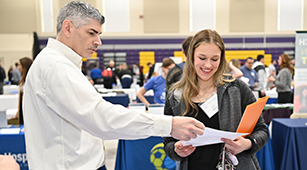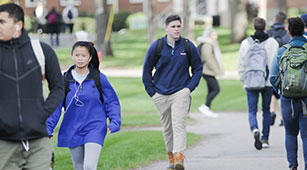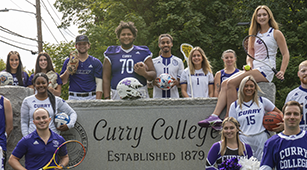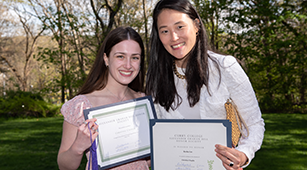Schedule an appointment to meet with Career & Experiential Learning about your area of interest.
Make an AppointmentContact International Student Services
- 617-333-2065
- international@curry.edu
- King Building, Rm. 111, Walk-in Hours: M, W: 10-11am, Th-F: 2-3pm
Traveling with an F1 Visa
Many students and scholars take the opportunity to travel home—or to another country—during their time in the U.S. While you can make plans to depart the U.S. at any time, you need to make certain that you have the appropriate documentation to return to the U.S. to resume your activities. (Listed Below)
Required U.S. Re-Entry Documents
Required Documents for F1 students:
- Valid passport
- Valid visa (except for Canadian and Bermudian citizens)
- Valid Form I-20 with a valid travel signature from Curry College
Returning to the U.S.
The information below will help facilitate your return to the U.S.
Check Your Visa:
The visa in your passport, listing your immigration status, permits you to re-enter the U.S. It does not grant permission to enter a third country (a country that is not the U.S. or your home country). If you are traveling to a third country, you may need a visa to enter that country.
International Student Services can only advise on re-entry to the U.S.; we cannot advise on visas going to third countries. We recommend that you contact the embassy or consulate of the country you will be traveling to and ask for specific information about visa requirements for citizens from your home country.
Returning from Canada, Mexico, or Adjacent Islands with an Expired U.S. Visa
For nonimmigrants who travel to Canada, Mexico, or the adjacent islands (except for Cuba) could be eligible to return to the U.S. using an expired U.S. visa. This rule is known as Automatic Visa Revalidation. To successfully use Automatic Visa Revalidation, travelers must have previously entered the U.S. in a nonimmigrant visa category, and must be maintaining valid nonimmigrant status. You can read more about Automatic Visa Revalidation on the Department of State website. Customs and Border Protection also has information on their website about this.
If you have questions about re-entering the U.S. from Canada, Mexico, or the adjacent islands using Automatic Visa Revalidation, please consult with International Student Services before you departing.
Please see the U.S. Immigration and Customs Enforcement website for a complete list of the adjacent islands.
Exceptions to the Automatic Visa Revalidation Rule
- Individuals who apply for a new visa stamp: If you plan to apply for a nonimmigrant visa stamp at a U.S. embassy or consulate in a contiguous territory (Canada, Mexico, or the adjacent islands), you will not be eligible to return to the U.S. under Automatic Visa Revalidation. Instead, you must wait for the new visa to be approved and then return to the U.S. under the new visa. If your visa application is denied, you will be required to travel elsewhere (most likely to your home country) to apply again for a U.S. visa stamp before you may return to the U.S.
- Citizens of certain countries are not eligible for Automatic Visa Revalidation: If you are a citizen of a country identified by the Department of State as a state that sponsors terrorism, you are not eligible for Automatic Visa Revalidation. Currently, this list includes Iran, North Korea, Sudan, Syria, and Cuba. The countries included on this list are subject to change, and you can find an updated list on the Department of State’s website.
- Citizens of Mexico and adjacent islands: Citizens of Mexico and countries of the adjacent islands may or may not be eligible for Automatic Visa Revalidation when traveling to their home country, depending on their individual circumstances. Citizens of Mexico and the adjacent islands can use Automatic Visa Revalidation when traveling to Canada.
Maintaining Status during Cruise Trips
If you plan to take a cruise, please bear in mind that the cruise ship may cross international borders. You should make certain to carry the same appropriate documentation as if you were returning from an international trip. Although some cruise companies require only copies of immigration documents, US immigration policies requires that you present original documents.
Check to see if there is already a travel signature on page 2 of your I-20. If your travel signature is still valid—meaning it was signed within the past year for continuing F-1 students, or within the past six months for F-1 students on OPT—you do not need a new one. If you need a new Travel Signature please Visit International Student Services during walk-in hours. If you are outside the U.S. without a travel signature or on OPT or in the Hybrid MBA program you may complete the Travel Signature request on the myCurry Portal.
A valid I-20 travel signature appears on page 2:
Example Travel Signature:

Frequently Asked Questions (FAQ)
What factors should I consider when deciding whether to travel during a time of political uncertainty?
- Do you have a valid visa to return? Can you obtain a new visa in the time allocated for travel?
- U.S. immigration history – do you have any gaps or violations in your U.S. immigration record?
- Social media presence/exposure that could concern U.S. federal authorities
- Data on electronic devices that might be viewed as a national security concern
- Inconsistency in information and documents submitted to USDOS and USCIS
- Criminal background in U.S. and abroad that could negatively impact your U.S. visa or U.S. admissibility
- International travel patterns to locations that could indicate national security concerns
- Evidence of cannabis use on your electronic devices
- Sensitivity of your field of study, research, expertise
- Current climate of enhanced vetting and scrutiny
It is important that you asses your individual situation and evaluate possible risks when making travels plans in the middle of your academic activities. While family emergencies could necessitate travel in the middle of your program, you might choose to postpone some vacation or professional-related travel until after program completion.
What to expect at the port of entry/border?
When you return to the U.S., U.S. Customs and Border Protection (CBP) will review your visa and other travel documents to decide if you are eligible to enter the country. A CBP officer may ask you questions—similar to those asked during your visa interview—about your plans and purpose for returning.
It’s important to know that having a valid visa does not guarantee entry. You should be prepared to clearly explain why you are returning to the U.S.
Entry may be denied for several reasons, such as:
- Certain health conditions (like infectious diseases)
- Criminal history
- Security concerns
- Risk of becoming a public charge (needing government assistance)
- Intention to work without proper authorization
- Missing or incorrect documentation
Most travelers are quickly processed during primary inspection at the port of entry. However, in some cases, you may be sent to secondary inspection, where officers review your documents more closely and may ask for additional information.
Keep in mind: You have very limited rights during secondary inspection. It’s important to review the information below carefully so you know what to expect.
What are your rights when you are seeking to enter the U.S.?
Note: The following general information is not a substitute for legal advice. Curry College recommends that you should consult an attorney if you have specific legal questions about your unique circumstances.
ACLU (American Civil Liberties Union)- Know Your Rights: Enforcement at the Airport
Inspection of Electronic Devices at the Border
The Fourth Amendment to the U.S. Constitution generally forbids “unreasonable searches and seizures” by the government. However, due to what is known as the “border search exception”, the Supreme Court has previously ruled that at the border, the government has a broader authority before someone is admitted into the U.S. Given this legal landscape, U.S. Customs and Border Protection (CBP) claims broad authority to search and seize electronic devices at the border.
During this type of search, CBP agents may look through your phone, look through the documents on your computer. This includes accessing any social media or communication apps that you are logged into on your devices. The government also claims the authority to copy the data on your electronic devices. You may also be asked to give your passwords or security information to CBP officers to facilitate the search of your devices. It has been reported that CBP takes the position that it has the right to obtain and keep passwords as necessary to facilitate digital searches of a device that has been detained. While you may not be legally required to comply and disclose password or security information, as a foreign national (ie., a visa holder), you may be perceived as failing to cooperate and CBP could deny you entry to the U.S. CBP officers may return your devices or on rare occasion, confiscate your devices for further examination.
If you do not want a particular electronic device searched, you may choose not to travel internationally with it. If you need to travel internationally with electronic devices, the safest course is to travel with devices that contain only the specific files needed for the trip. CBP has the legal authority to perform a routine search of electronic devices that you carry across the border. If CBP decides to question you, or inspect your electronic devices, you should never lie to or attempt to deceive CBP personnel, or try to obstruct the investigation (ie, by deleting data). CBP personnel are federal agents – misrepresentation or lying to federal agents or knowingly interfering with their investigation is a crime. If CBP retains custody of your devices, make sure you get a receipt that describes your device and includes contact information so you can follow up at a later date.
What should I do after I return to the U.S.?
When you arrive in the U.S., U.S. Customs and Border Protection (CBP) will electronically update your I-94 entry record to reflect the immigration status in which you were admitted and the length of lawful stay that you have been granted.
For F-1 students, and F-2 for their dependents, The electronic record should reflect your correct status and “D/S” (duration of status) for Admit Until Date.
Each time you reenter the U.S. it is important to check your electronic I-94 record to make certain these are correct. We recommend that you retrieve your electronic I-94 record after each entry to the United States and save a copy of your records. Errors to your admission status or length of stay can jeopardize your ability to study, work and remain lawfully in the U.S. If you discover an error to your electronic I-94 record, contact International Student Services immediately to discuss how this can be corrected.
Example I-94 Record:

Current Travel Advisory
Key Factors to Consider When Planning International Travel:
- Do you have the necessary immigration documentation to return to the U.S.?
- Do you need a travel signature on your I-20 or DS-2019? See details below.
- Do you have a valid U.S. visa?
- If not, can you obtain a new visa in time to return before the start of the next semester?
- If not, are you a national of a country under a current or possible expanded U.S. entry/travel ban?
- Are there other current or political events (military conflicts or sanctions) that could impact your ability to travel and/or obtain a visa? For example:
- Considerations with a change in federal administration.
- Consular posts can close without advance notice due to natural disasters or political conflicts
- Some graduate students and researchers from China are still experiencing visa denials and visa revocations due to Presidential Proclamation 100043
- Even with a valid visa, some travelers are denied entry to the US port of entry due to U.S. political sanctions on businesses and nationals of other countries
It is important that you assess your individual situation and evaluate possible risks when making travel plans in the middle of your academic activities. While family emergencies could necessitate travel in the middle of your program, you might choose to postpone some vacation or professional-related travel until after program completion.





